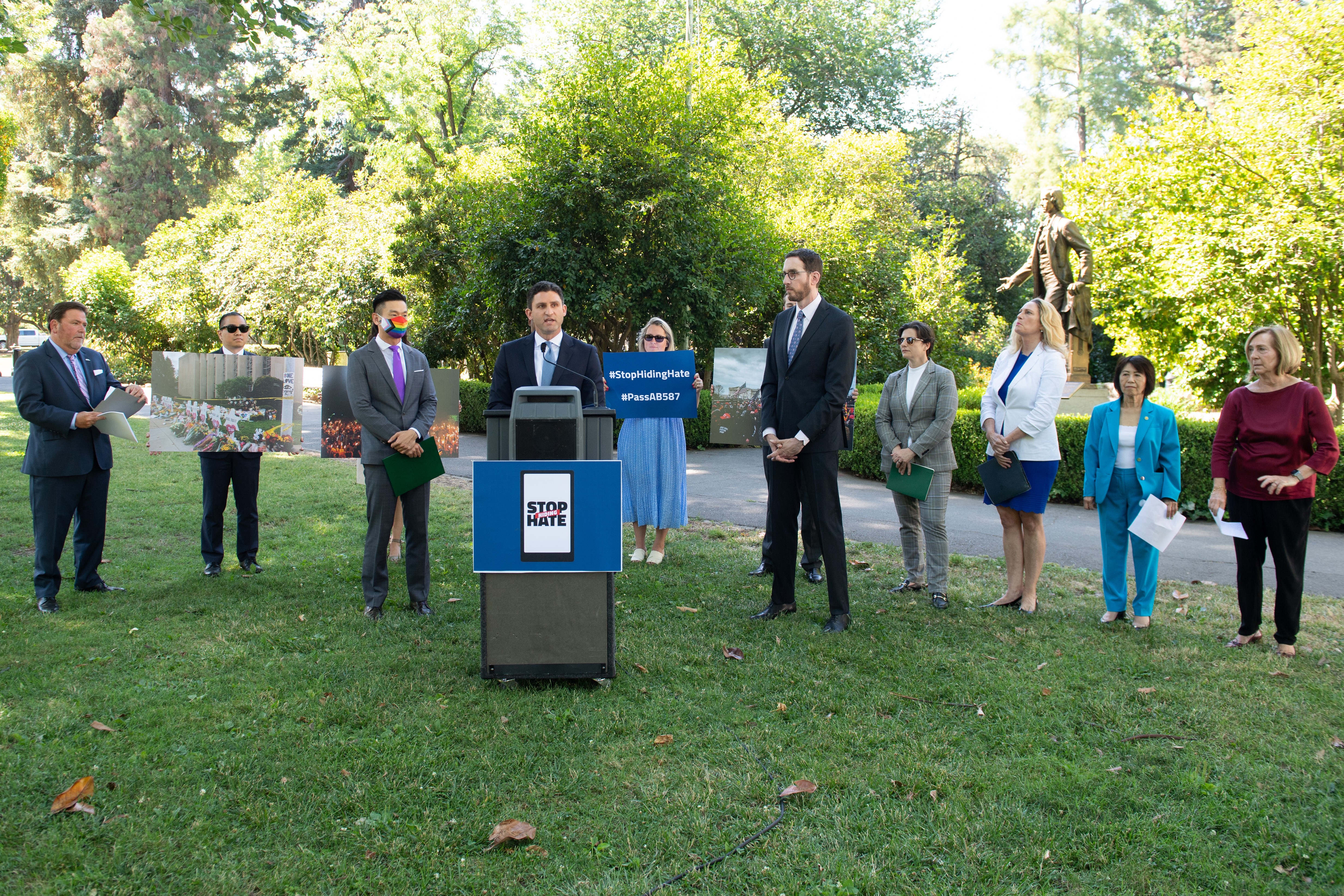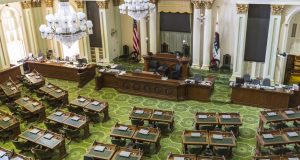SACRAMENTO, CA– Earlier this week, Assemblymember Jesse Gabriel (D – Woodland Hills), other elected officials, community leaders, and civil rights organizations gathered to discuss social media’s role in amplifying recent surges in violence across the country and call for the passing of Assembly Bill (AB) 587, a first-of-its-kind measure to require social media platforms to publicly disclose their policies regarding online hate, disinformation, extremism, and harassment, as well as key metrics and data regarding the enforcement of those policies.
The Anti-Defamation League (ADL), a key supporter of AB 587, also rolled out a new nationwide report at the event on the state of online hate and harassment in the U.S. Key findings include: Asian Americans reporting a dramatic increase in harassment, paralleling the rise in anti-Asian hate incidents offline; LGBTQ+ individuals experiencing harassment at the highest levels among all respondents; and nearly half of youth ages 13-17 reporting experiencing some type of harassment, and more than a third in the past 12 months.
“Californians are becoming increasingly alarmed about the role of social media in promoting hate, disinformation, conspiracy theories, and extreme political polarization,” said Assemblymember Jesse Gabriel. “It’s long past time for these companies to provide real transparency into their practices. The public and policymakers deserve to know when social media companies are amplifying certain voices and silencing others. This is an important step in a broader effort to protect our vulnerable communities and hold Big Tech accountable.”
New studies and reports are drawing ties between hate-motivated violence, mass shootings, and online activity. The assailants in the El Paso shooting in 2019, the Isla Vista shooting in 2014, the Tree of Life Synagogue shooting in 2018, the Charleston shooting in 2015, the Parkland shooting in 2018, and the Buffalo shooting earlier this year all utilized social media to engage in hateful activity and were often radicalized online. A recent bulletin by the Department of Homeland Security has warned the public of extremist, copycat behavior promulgated in online forums following the Uvalde shooting. Just last week in Coeur d’Alene, Idaho, a group of white supremacists who attempted to disrupt an attack a pride event were exposed for frequenting online chats groups targeting the LGBTQ community.
Despite widespread concerns, efforts by social media companies to self-police have been widely criticized as grossly inadequate. As disclosed by Facebook whistleblower Frances Haugen and other sources, social media platforms will recommend harmful, divisive, or false content even where a user is not looking for it. Facebook, for example, has evidence that its algorithms encourage polarization and “exploit the human brain’s attraction to divisiveness,” but the company has declined to implement proposed solutions to address these concerns.
AB 587 would address this troubling lack of transparency by requiring platforms to file reports disclosing: their corporate policies on hate speech, disinformation, extremism, harassment, and foreign political interference; their efforts to enforce those policies; and any changes to their policies or enforcement practices. The measure also would require disclosure of key metrics and data regarding such content, including the number of pieces of content, groups, and users flagged for violation; the method of flagging, and the type and content of action flagged.
“Disinformation and extremism are running rampant on social media platforms, and sadly it only seems to be getting worse,” said Senator Scott Wiener (D-San Francisco). “We need to hold social media companies accountable for the spread of violent extremism and the racism, sexism, transphobia, and antisemitism taking over the internet. More accountability and transparency for social media companies will help us address this problem and keep people safer. Assemblymember Gabriel’s AB 587 will make the internet a safer place.”
AB 587 is supported by a coalition of leading civil rights and technology accountability organizations:
- ? “A key step in tackling anti-AAPI hate is to make our online communities safer. Asian Americans and Pacific Islanders have been the targets of racial discrimination and scapegoating in digital spaces, which have perpetuated the rise in attacks on our community in the past two years. AB 587 is a fundamental step in the right direction and we urge the Senate Judiciary Committee to pass it out of committee.” – Linda Ng, National President of OCA-Asian Pacific American Advocates
- ? “According to ADL’s Online Hate and Harassment Report, 65% of those in a marginalized group, including Jews, women, and people of color, experienced hate-based harassment online because of their identity. That is harassment simply for existing. This is unacceptable and we must address it with meaningful legislation. Assembly Bill 587, which is a foundational approach to bringing to light the real issue of hate online, would require big social media
platforms to be more transparent in their reporting and content moderation policies.” – Jeffrey I. Abrams, Regional Director of ADL Los Angeles
- ? “Greater transparency can combat the rise of disinformation, hate speech, and calls to violence that are omnipresent on social media and destructive to our democracy. By creating clear guidelines requiring online platforms to disclose their policies and their enforcement of those policies, AB 587 will increase public trust and engender more awareness by tech companies about the deceptive and harmful activity on their platforms. To preserve our democracy, social media platforms must be accountable and transparent to the public, and this bill is an important step in that direction.” – Ann M. Ravel, Policy Director at Decode Democracy and former Chair of the Federal Election Commission
- ? “Like many other marginalized communities, the California Women’s Law Center is sadly very familiar with the hate and harmful content that women experience every single day online. And not only do many of these companies know their platforms are toxic—especially for young girls—but they consistently play down their negative effects to the public and policymakers. We can’t continue to leave these companies to their own devices—we need transparency and accountability now.” – Betsy Butler, former Assemblywoman and Executive Director of the California Women’s Law Center
AB 587 is set to be heard in Senate Judiciary Committee next week.
 Westside Story Newspaper – Online The News of The Empire – Sharing the Quest for Excellence
Westside Story Newspaper – Online The News of The Empire – Sharing the Quest for Excellence





